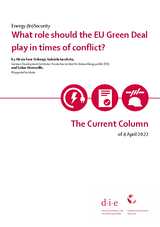Energy (In)Security
What role should the EU Green Deal play in times of conflict?
Faus Onbargi, Alexia / Gabriela Iacobuta / Lukas HermwilleThe Current Column (2022)
Bonn: German Development Institute / Deutsches Institut für Entwicklungspolitik (DIE), The Current Column of 4 April 2022
Bonn, 4 April 2022. Current geo-political instability in Europe resulting from Russia’s invasion of Ukraine has put energy security at the top of the agenda. Halting the controversial Nord Stream 2 project is just one example of some of the serious measures taken in response by European countries. Germany is one of the most dependent countries on Russia’s fossil fuels. In 2020, German energy consumption relied on Russian imports for 37.2% of oil, 20.9% of coal and crucially 45.7% of natural gas, according to the International Energy Agenda (IEA). The German context is only a reflection of the important vulnerabilities in the wider EU energy system (40% of the EU’s natural gas consumption is supplied by Russia). These are set to be addressed in a plan to put the bloc on a path to energy independence from Moscow before 2030.
Yet, such independence should not be achieved simply by shifting fossil fuel supply to other sources, such as liquefied natural gas (LNG). Rather, in the long run, it can and should be achieved with an urgent and rapid development of renewable energies (RE) - particularly wind, solar and green hydrogen - and by energy efficiency improvements. As such, delaying or even altering the European Green Deal as some members of the EU Parliament have argued, should not be an option during times of multiple global crises. Now is the time to put the European Green Deal at the centre of energy security policy in the EU, alongside coordinated action in the domains of health, food, biodiversity, green industrial development and climate.
In the short term, a strong focus on energy efficiency and a campaign towards energy sufficiency can be particularly helpful to reduce natural gas demand. During the spring and summer, the EU has the opportunity to focus on increasing the coverage of building insulation, on improving heating systems and on substituting gas boilers with heat pumps. Jointly, these could lead to a reduction of 4 billion cubic metres of natural gas consumption within a year, according to the IEA, and possibly more.
In the short and medium term, climate action in the EU must incentivize a strong commitment to go all in on RE (and the infrastructure to accommodate intermittent energy sources), thus pushing the electrification of energy services that currently use natural gas. Solar and wind power technology, which could reduce gas use in the EU by 6 billion cubic metres according to the IEA, is ready and can be deployed very quickly. This deployment is currently held back mostly by regulation. In Germany, for example, slow and unpredictable permitting processes are key obstacles to a more rapid wind power phase-in.
In the medium and long-term, diversification from imports of Russian gas should also include other substitutes, particularly green hydrogen. It is through the import and ratcheted domestic production of RE-made green hydrogen that the EU can first, accelerate decarbonisation of key industries and second, boost its global role in green energy production by becoming an important trading partner to other countries. A rapid transition to green hydrogen will be crucial for energy-intensive industries, such as steel production, and especially those that cannot be electrified. Investments in this space and clear signals to the private sector are required today.
Finally, the EU should take the international component of the European Green Deal seriously and foster strong global partnerships. For example, importing energy-intensive raw materials produced with renewable energy in regions with higher potential could enable energy transitions worldwide. For instance, South African researchers have proposed to develop the production of green primary iron using the country’s iron ore resources, its vast renewable energy potential and industrial capacity. This green primary iron could then be exported to Europe to be used in existing steel plants to produce steel with significantly lower embedded emissions. Establishing such new trade relationships may also have unintended side effects. Therefore, strong scrutiny of potential trade-offs with other areas of sustainable development is required. For example, a global maize, wheat and sunflower oil shortage due to the war in Ukraine should not be exacerbated by increased biofuel production. Investing in building partnerships that ensure mutual benefits should be a key aim of the EU.
European energy dependency can only be limited by reducing our dependence on fossil fuels. This is perfectly aligned with the ambition of the European Green Deal to make Europe the first climate neutral continent. The European Green Deal may have been designed to address climate change but it is also our best answer to respond to a new geo-political reality. If anything, the EU needs to accelerate the European Green Deal and not delay it. If successful, it has the potential to lie at the heart of an energy-secure, net-zero EU that takes a firm stance in the face of climate catastrophe and geo-political belligerence.
Alexia Faus Onbargi and Gabriela Iacobuta are researchers at the German Development Institute / Deutsches Institut für Entwicklungspolitik (DIE), Lukas Hermwille is researcher at the Wuppertal Institute.



